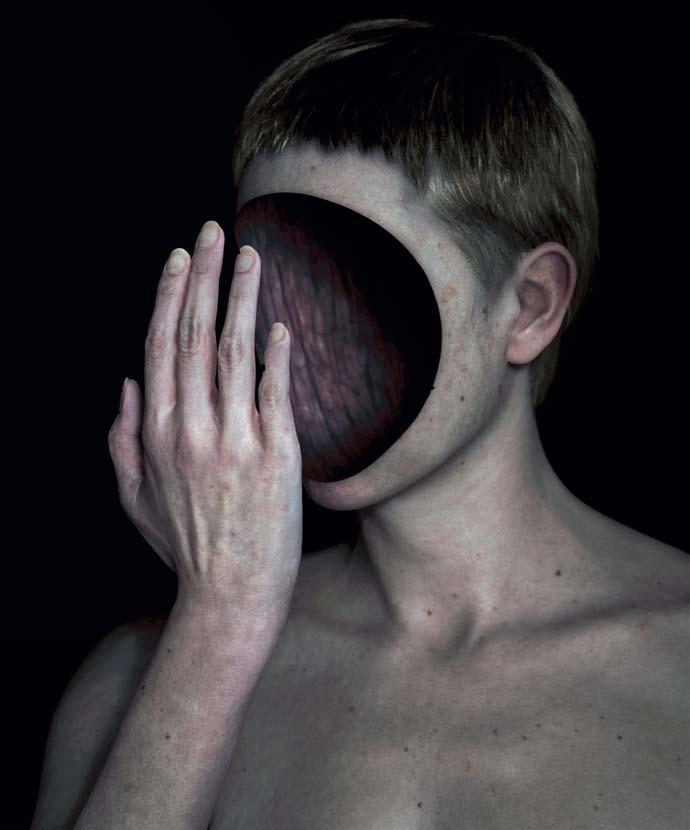Versuchen GOLD - Frei
Can AI make intelligent art?
The Guardian Weekly
|April 19, 2024
Pierre Huyghe's uncanny machine-human hybrids are the latest attempt to find deeper meaning in a technology that leaves many playing catch-up

Two people dressed in black are kneeling on the floor, so still that they must surely be in pain. If they are grimacing, there would be no way to know - their features are obscured by oversized, smooth gold masks, as though they have buried their faces in half an Easter egg.
Their stillness makes them seem like sculptures, and only by checking for the subtle rise and fall of their chests can you confirm they are indeed human. Which is fitting - because they aren't actually human, at least not totally. They're human-machine hybrids, "Idioms", created by French artist Pierre Huyghe for his exhibition, Liminal, at the Punta della Dogana in Venice.
Idioms are wandering the exhibition for its run between March and November. Sensors in their masks monitor the rooms they sit in and visitors they encounter, and artificial intelligence will gradually convert this information into a brand new language-building a dictionary until they will even be able to communicate with one another. Every day, their knowledge will accumulate; Huyghe wonders what they might be able to say in 20 years' time.
Shortly before the exhibition opens to the public, two Idioms kneel in a darkened room opposite a large black box suspended from the ceilingthis is a "self-generating instrument", producing ambient music and crisscrossing beams of light. In response to the artwork in front of them, the Idioms appear to have only generated a few syllables, repeated as the LED screens on their foreheads glow gold.
Diese Geschichte stammt aus der April 19, 2024-Ausgabe von The Guardian Weekly.
Abonnieren Sie Magzter GOLD, um auf Tausende kuratierter Premium-Geschichten und über 9.000 Zeitschriften und Zeitungen zuzugreifen.
Sie sind bereits Abonnent? Anmelden
WEITERE GESCHICHTEN VON The Guardian Weekly
The Guardian Weekly
My boyfriend's use of AI stops him thinking for himself
My boyfriend of eight years, who is 44, has ADHD and runs his own business.
2 mins
February 27, 2026

The Guardian Weekly
'Our land lets us all breathe clean oxygen'
The Congo River basin is home to a biodiverse ecosystem-and a relentless trade in timber and charcoal
3 mins
February 27, 2026

The Guardian Weekly
Nations apart: Andrew's UK arrest highlights US passivity on Epstein files
It is a tale of two nations.
2 mins
February 27, 2026

The Guardian Weekly
Under water: Engulfed by storms, but climate denial grows
In the week between Christmas and the New Year, two Spanish men in their early 50s - friends since childhood - went to a restaurant and did not come home.
3 mins
February 27, 2026

The Guardian Weekly
The crown in court
A brief history of royal run-ins with the law
3 mins
February 27, 2026

The Guardian Weekly
Big in Beijing
James Balmont's band, Swim Deep, plays to crowds of hundreds across the UK - but in China, they play to tens of thousands. And they're not the only ones
3 mins
February 27, 2026
The Guardian Weekly
Trump's Board of Peace is serving private interests more than public good
In Gaza, aid still trickles in at levels relief agencies say are far below what is required.
2 mins
February 27, 2026

The Guardian Weekly
Needle drops Weight-loss pills are here - and big pharma stands to gain
Oral tablets could bring obesity treatment into the mainstream, with the sector predicted to be worth $200bn by the end of the decade
6 mins
February 27, 2026

The Guardian Weekly
How Italians gradually warmed to their Winter Olympics
With the atmosphere in Rome subdued as the Winter Olympics unfolded across northern Italy, travelling to the Games was not on Amity Neumeister's radar.
3 mins
February 27, 2026

The Guardian Weekly
Fire and fury
Violence erupts as security forces kill feared cartel boss.
1 min
February 27, 2026
Listen
Translate
Change font size
